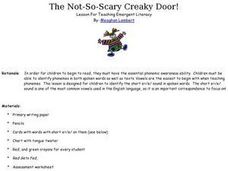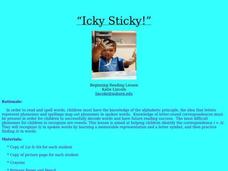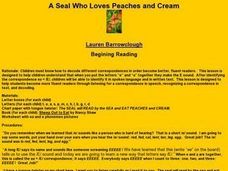Curated OER
Vacuum that Rug
Students identify the letter and phoneme /n/ in written and spoken language. Students practice the production of the /n/ sound through stories and rhymes. They identify the initial placement of the letter and sound using a picture...
Curated OER
The Not-So-Scary Creaky Door!
Students recognize the short vowel e in spoken language. Through listening activities, they discriminate the short vowel phoneme /e/ from other phonemes. Students associate the phoneme with its letter representation and identify the...
Curated OER
Eddie the Egg
First graders recognize the short vowel e in written and spoken language. Through matching activities, they discriminate the short vowel /e/ from other phonemes. Students associate the phoneme with its letter representation and identify...
Curated OER
Chimps Chugging Chocolate Milk
First graders identify the digraph /ch/ in written and spoken language. After a brief discussion of the independent and combined sounds of the phonemes /c/ and /h/ students practice identifying initial and final placement of the new...
Curated OER
Pretty, Pretty Queen!
Students identify and listen for the beginning sounds of words (specifically p and q). They recognize and comprehend the differences between p=/p/ and q=/kw/. Students practice writing p and q and also looking for them and listening for...
Curated OER
"Poppy P"
Students engage in a instructional activity of emerging literacy that focuses on phonemic awareness. The phoneme for the letter "p" is chosen for the instructional activity and students must acquire the skill of letter recognition also.
Curated OER
Icky, Sticky!!
Students participate in an emerging literacy lesson that focuses on the skill of phonemic awareness. The phoneme of choice is the letter "i". Students need to recognize the letter in correlation to its sound.
Curated OER
Dinosaur Alliterations
In this alliteration worksheet, students review the definition and an example for alliterations. Students then write their own alliterations about dinosaurs and illustrate one of their examples in the box.
Curated OER
Get your Mouth Examined
Students recognize the short vowel o in written and spoken language. Through matching and listening activities, they discriminate the short vowel /o/ from vowel phonemes. Students associate the phoneme with its letter representation and...
Curated OER
Alligator Open Wide
First graders recognize the short vowel a in written and spoken language. Through listening activities, they discriminate the vowel sound /a/ from other phonemes. Students associate the phoneme with its letter representation and identify...
Curated OER
Don't Punch Too Hard
Students recognize the short vowel u in written and spoken language. Through matching and listening activities, they discriminate the vowel sound /u/ from other phonemes. Students identify the phoneme and letter in words and pictures.
Curated OER
It's Icky Sticky
Young scholars recognize the short vowel a in written and spoken language. Through matching and listening activities, they discriminate the vowel sound /a/ from other phonemes. Students identify the phoneme and letter in pseudo words...
Curated OER
Olly at the Doctor
Students recognize the short vowel "O" in written and spoken language. Through matching activities, they discriminate the short vowel /o/ from other vowel sounds. Students associate the phoneme with its letter representation and identify...
Curated OER
Unopened Umbrella
Students explore vowel correspondences. They discuss the vowel correspondence u=/u/. They identify u=/u/ in written words and a meaningful representation and letter symbol for the sound. Students read and write words using u=/u/.
Curated OER
Shiny Shells on the Shore
Students investigate how: A single phoneme, which is a vocal gesture in spoken words, can be represented by more than one grapheme. Also how a digraph is the combination of two letters that make one sound (there are both vowel and...
Curated OER
Hop To It
Learners identify the grapheme and phoneme for H. They practice writing the letter H and through listening activities, discriminate the phoneme /h/. They associate the phoneme /h/ with its letter representation and identify it as the...
Curated OER
Got Gulp
Students recognize the phoneme /g/. Through matching activities, students discriminate the phoneme /g/ from other letters and phonemes. They associate the phoneme with its letter representation and identify the phoneme in various words...
Curated OER
Icky "I"
Students recognize the short vowel i in written and spoken language. Through matching and listening activities, they discriminate the short vowel /i/ from other phonemes. Students associate the phoneme with its letter representation and...
Curated OER
Iiicky, Stiicky, I
First graders recognize the short vowel i in written and spoken language. Through listening and matching activities, they discriminate the vowel sound /i/ from other phonemes. Students identify the phoneme and letter in psuedo words they...
Curated OER
Icky Sticky Tin Man
Students recognize the short vowel i in written and spoken language. Through listening and matching activities, they discriminate the vowel sound /i/ from other phonemes. Students associate the phoneme with its letter representation and...
Curated OER
Can You Open the Creaky Door?
Students recognize the short vowel e in written and spoken language. Through matching and listening activities, they discriminate the vowel sound /e/ from other phonemes. Students identify the phoneme and letter in words and pictures.
Curated OER
Icky Sticky
Students recognize the short vowel i in written and spoken language. Through matching and listening activities, they discriminate the vowel sound /i/ from other phonemes. Students identify the phoneme and letter in words and pictures.
Curated OER
A Seal Who Loves Peaches and Cream
Learners decode correspondence in order to become better, fluent readers. When the letters e and a are put together they make the E sound. They become more fluent readers through listening for a correspondence in speech, in text, and...
Curated OER
Fish Wish
Students identify the digraph /sh/ in written and spoken language. After a reading of a decodable story containing the digraph, students practice identifying the initial and final placement of the new digraph /sh/ in words using a...
Other popular searches
- Tongue Twisters P
- Tongue Twisters Long E
- Tongue Twisters Short U
- Tongue Twisters V
- Letter K Tongue Twisters
- Tongue Twisters Letter P
- Tongue Twisters Short O
- Tongue Twisters R
- Space Tongue Twisters
- Tongue Twisters P Sample
- Tongue Twisters v Sounds
- Tongue Twisters D

























